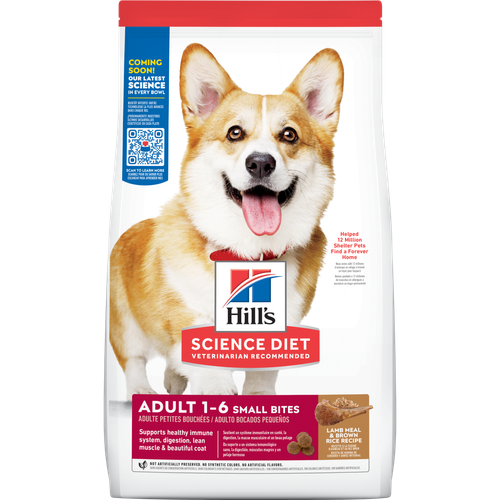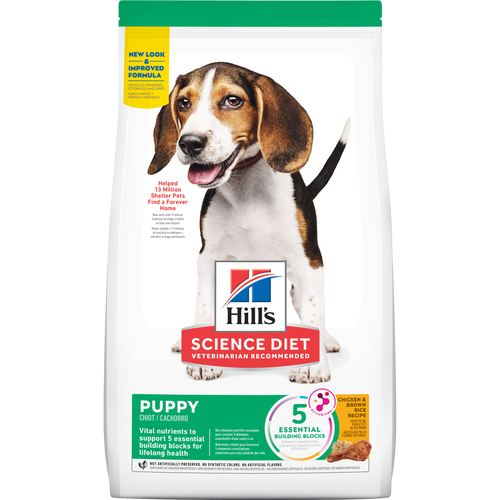
-
Find the right food for your petTake this quiz to see which food may be the best for your furry friend.Find the right food for your petTake this quiz to see which food may be the best for your furry friend.Featured products
 Hill's Science Diet Adult Oral Care Chicken, Brown Rice & Barley Recipe Dog Food
Hill's Science Diet Adult Oral Care Chicken, Brown Rice & Barley Recipe Dog FoodClinically proven kibble technology to reduce plaque & tartar build-up
Shop Now Adult Small Bites Lamb Meal & Brown Rice Recipe Dog Food
Adult Small Bites Lamb Meal & Brown Rice Recipe Dog FoodSupports lean muscle, for dogs who prefer smaller kibble
Shop Now Adult Small Bites Chicken & Barley Recipe Dog Food
Adult Small Bites Chicken & Barley Recipe Dog FoodSupports lean muscle for dogs who prefer smaller kibble
Shop NowFeatured products Adult Perfect Digestion Chicken, Barley & Whole Oats Recipe Dog Food
Adult Perfect Digestion Chicken, Barley & Whole Oats Recipe Dog FoodScience Diet's breakthrough nutrition supports ultimate digestive well-being & healthy microbiome
Shop Now Adult Perfect Digestion Salmon, Whole Oats, and Brown Rice Recipe Dog Food
Adult Perfect Digestion Salmon, Whole Oats, and Brown Rice Recipe Dog FoodScience Diet's breakthrough nutrition supports ultimate digestive well-being & healthy microbiome
Shop Now Hill's Science Diet Adult 7+ Healthy Cuisine Roasted Chicken & Rice Medley Cat Food
Hill's Science Diet Adult 7+ Healthy Cuisine Roasted Chicken & Rice Medley Cat FoodDelicious roasted chicken and rice in a mouthwatering sauce
Shop Now -
Featured articles
 The Incredible Science Behind Your Pet's Microbiome
The Incredible Science Behind Your Pet's MicrobiomeLearn what a pet's microbiome is, how it contributes to your pet's gut & overall health, and why nutrition is important in maintaining healthy microbiomes.
Read More Pet Food Storage Tips
Pet Food Storage TipsDiscover how and where to store your dry, as well as canned, dog and cat food. Learn how to find the "best before" dates on all Hill's pet food packaging.
Read More Water
WaterDiscover why water is the most important nutrient for your dog or cat to live a healthy life. Find out how much water your pet should consume each day.
Read More -



Large and giant breed dogs — Great Danes, German shepherds, Labrador retrievers and the like — have different nutritional needs than smaller breeds. All puppies are born with their bones still developing, but large breed puppies are more susceptible to developmental bone and joint disease during their rapid growth phase to 1 year of age. In fact, large breeds reach 50 percent of their body weight at around 5 months of age. Smaller breeds reach 50 percent of their body weight at around 4 months of age.
The growth rates of all puppies are dependent on the food that they eat. Puppies should be fed to grow at an average, rather than a maximum, growth rate. Compared to smaller-sized puppies, large breed puppies need restricted levels of fat and calcium to moderate their rate of growth. They’ll still reach their full-grown size, just over a longer period of time, which will result in healthy development of bones and joints for these breeds.
Two key nutrients that should be decreased for large breed puppies are fat (and total calories) and calcium:
- Fat: High fat/calorie intake causes rapid weight gain, and bones/muscles aren’t developed enough to support the excessive body weight. Controlling the fat level and total calories in the food for these puppies may help reduce the risk of developmental bone and joint problems.
- Calcium: Excessive calcium intake increases the likelihood of skeletal problems. It is also recommended that calcium supplements not be fed with any commercial pet food for growth.


Tasty Tips
Hill’s Large Breed products are designed to help large breed dogs live long, quality lives. We limit the levels of calcium and fat in Hill’s® Science Diet® Puppy Large Breed dog food, but we do add high levels of certain nutrients that have been shown to benefit big dogs — like omega-3 fatty acids, L-carnitine and the highest levels of the antioxidant vitamins E+C versus all leading brands. These nutrients help maintain healthy joints and cartilage because large breed dogs are more likely to put stress on their joints due to their size. Mastiffs, Labs ,and all the other large and giant breeds that we love can benefit from precisely balanced nutrition to live their lives to the fullest.


One of our staff authors prepared this article for you
Related products

Clinically proven kibble technology to reduce plaque & tartar build-up

Supports lean muscle for dogs who prefer smaller kibble

Vital nutrients to support 5 essential building blocks for lifelong health

Supports lean muscle, for dogs who prefer smaller kibble
Related articles

Learn how to stop your dog from begging at the dinner table, and understand how it can help contribute to his health.

Discover how the field of dog science is giving us more and more insights into the inner workings of our furry best friends.

Your dog's coat and skin are a big part of your dog's overall health. Ensure you keep your dog's coat healthy, by following these simple tips.

Gather the following puppy supplies to prepare your family for all the fun (and commitment) that comes with being a dog parent.

Put your dog on a diet without them knowing
Our low calorie formula helps you control your dog's weight. It's packed with high-quality protein for building lean muscles, and made with purposeful ingredients for a flavorful, nutritious meal. Clinically proven antioxidants, Vitamin C+E, help promote a healthy immune system.
Put your dog on a diet without them knowing
Our low calorie formula helps you control your dog's weight. It's packed with high-quality protein for building lean muscles, and made with purposeful ingredients for a flavorful, nutritious meal. Clinically proven antioxidants, Vitamin C+E, help promote a healthy immune system.

